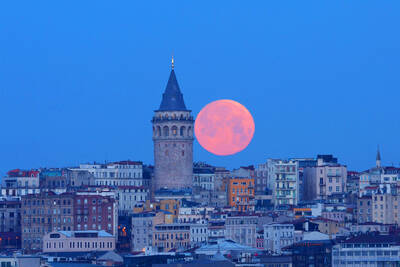Yu Kei-cheong had great success with his first textbook, using short stories to help primary school pupils understand math, and a second volume is set to be released in the coming weeks.
But the teacher will never see that happen. He leapt to his death from his 22nd-storey apartment early this month -- watched by his teenage daughter -- after complaining of being unhappy at work.
Yu's was the second suicide that week by a Hong Kong teacher, and their deaths have sparked a renewed public debate about the hard-working lifestyle of this global financial center.
"Hong Kong is a very ill society," says Paul Yip, director of the Center for Suicide Research and Prevention at Hong Kong University.
"People are facing a lot of pressure at work. You used to have three people doing the same job, now you have two. Everyone is after higher productivity and more financial gains," he says.
Hong Kong's suicide rate of 18.6 per 100,000 people is above the world average of 14.5, and officials say the rate is increasing dramatically among working-age professionals as well as unskilled workers.
In 2003, the last year for which the figures have been fully compiled, there were 1,264 suicides, up 14.1 percent over 2002. The rate works out to more than three people every day.
Among professionals the suicide rate per 100,000 people increased from 2.28 between 1990 and 1994 to 7.3 from 1999 to 2003, according to official figures -- more than a threefold increase.
Clinical psychologist Paul Wong, who wrote the content for "Depressed Little Prince," the suicide center's Web site, says that people in the city who are suffering from depression are reluctant to seek help.
"Hong Kong people think that depression is a psychiatric illness, which is equivalent to being crazy," Wong says.
According to the WHO, depression ranks fourth in the 10 leading causes of global burden of disease and is expected to become the No. 2 two cause within the next two decades.
Many experts believe that financial instability may account for the rising number of Hong Kongers who are taking their own lives.
Economic turmoil from the 1997 Asian financial crisis and the SARS outbreak in 2003 have had a tremendous impact on the lives of ordinary people in a city that provides few economic safety nets.
"Figures in the West found people who committed suicide because of financial worries were fewer," Yip says. "Chinese people seem to be more worried about money matters."
But he stresses that money troubles are not the only motivation for suicide.
"Does the economic recovery mean everyone is happy? No. Did the teachers who killed themselves have financial problems? No, but they did it," he says.
Yip adds that work stress is another factor in Hong Kong, where workplace-related illness is believed to add around HK$40 million (US$5.1 million) to the city's health-care costs.
The families of both teachers have blamed new education reforms for the deaths of their loved ones, saying the changes added to their already heavy workloads.
The Professional Teachers' Union said several surveys showed teachers are working up to 60 hours a week since the reforms, which increased the number and size of classes they teach.

RARE EVENT: While some cultures have a negative view of eclipses, others see them as a chance to show how people can work together, a scientist said Stargazers across a swathe of the world marveled at a dramatic red “Blood Moon” during a rare total lunar eclipse in the early hours of yesterday morning. The celestial spectacle was visible in the Americas and Pacific and Atlantic oceans, as well as in the westernmost parts of Europe and Africa. The phenomenon happens when the sun, Earth and moon line up, causing our planet to cast a giant shadow across its satellite. But as the Earth’s shadow crept across the moon, it did not entirely blot out its white glow — instead the moon glowed a reddish color. This is because the

DEBT BREAK: Friedrich Merz has vowed to do ‘whatever it takes’ to free up more money for defense and infrastructure at a time of growing geopolitical uncertainty Germany’s likely next leader Friedrich Merz was set yesterday to defend his unprecedented plans to massively ramp up defense and infrastructure spending in the Bundestag as lawmakers begin debating the proposals. Merz unveiled the plans last week, vowing his center-right Christian Democratic Union (CDU)/Christian Social Union (CSU) bloc and the center-left Social Democratic Party (SPD) — in talks to form a coalition after last month’s elections — would quickly push them through before the end of the current legislature. Fraying Europe-US ties under US President Donald Trump have fueled calls for Germany, long dependent on the US security umbrella, to quickly

Romania’s electoral commission on Saturday excluded a second far-right hopeful, Diana Sosoaca, from May’s presidential election, amid rising tension in the run-up to the May rerun of the poll. Earlier this month, Romania’s Central Electoral Bureau barred Calin Georgescu, an independent who was polling at about 40 percent ahead of the rerun election. Georgescu, a fierce EU and NATO critic, shot to prominence in November last year when he unexpectedly topped a first round of presidential voting. However, Romania’s constitutional court annulled the election after claims of Russian interference and a “massive” social media promotion in his favor. On Saturday, an electoral commission statement

In front of a secluded temple in southwestern China, Duan Ruru skillfully executes a series of chops and strikes, practicing kung fu techniques she has spent a decade mastering. Chinese martial arts have long been considered a male-dominated sphere, but a cohort of Generation Z women like Duan is challenging that assumption and generating publicity for their particular school of kung fu. “Since I was little, I’ve had a love for martial arts... I thought that girls learning martial arts was super swaggy,” Duan, 23, said. The ancient Emei school where she trains in the mountains of China’s Sichuan Province